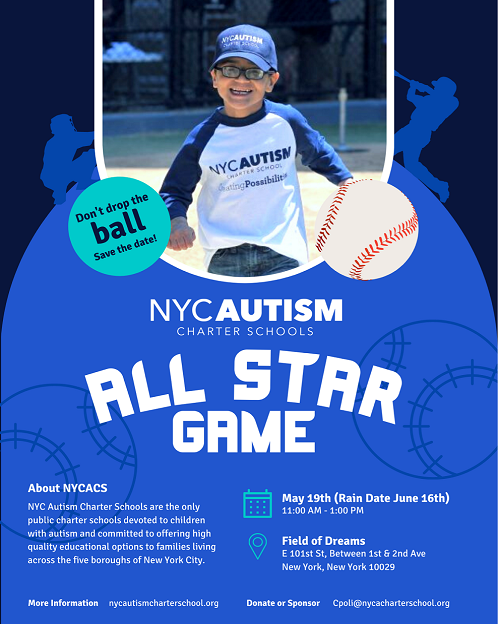POLICY ON USE OF INTERNET-ENABLED DEVICES DURING THE SCHOOL DAY
In May 2025, a new law was enacted that prohibits students from using non-school issued internet-enabled devices during the school day while on school grounds. The law applies to all school districts, Boards of Cooperative Educational Services, and charter schools, including NYC Autism Charter Schools. This policy was developed in consultation with NYC Autism Charter School stakeholders, including school leadership and staff, parents and students.
For purposes of this policy, the following definitions apply:
Internet-enabled device(s): smartphone, tablet, smartwatch or other devices capable of connecting to the internet and enabling the use to access content on the internet, including social media applications, including, without limitation, computing devices such as laptops, iPad and tablets; portable music and entertainment devices such as iPod and gaming consoles.
Non-internet enabled device(s): cellular phone or other communication device not capable of connecting to the internet or enabling the student to access the internet.
Parent: a student’s parent(s) or guardian(s) or person(s) in any parental or custodial relationship to the student, or any individual designated by the parent to act in loco parentis
School Day: The entirety of the instructional day (including all non-instructional time during the school day such as homeroom period, lunch, recess, study halls, and passing time).
School Grounds: All building structures, athletic playing fields, playgrounds or land contained within the real property boundary line of the school.
As a school designed to serve those profoundly affected by autism (all with IEPs stipulating a 12-month, specialized program), NYCACS students do not typically have the prerequisite cognitive, language, and/or social skills to use an internet-enabled device in the way that their neurotypical peers might. As a result, most do not own or carry such devices to and from school and, instead, use school-issued devices for instruction, sanctioned leisure or break activities, and communication purposes. Additionally, the teacher/student ratio in almost all NYCACS classrooms is 1:1, which means that students are highly supervised at all times, including when using school-issued electronic devices. However, there may, on occasion, be students who bring their own internet-enabled device to school and who shall be subject to this policy.
Students shall not use internet-enabled devices during the school day on school grounds unless such use is subject to an exception set forth in this policy. This policy does not preclude the use of (i) non-internet-enabled devices; or (ii) internet-enabled devices supplied by the school for educational services that are used for an educational purpose.
Exceptions
- If authorized by a Head Teacher, Head of School, or Clinical Director for a specific educational purpose,
- Where necessary for the management of a student’s healthcare,
- In the event of an emergency,
- For translation services,
- On a case-by-case basis, upon review and determination by a school psychologist, school
social work or school counsel, for a student caregiver who is routinely responsible for the care and wellbeing of a family member,
- Where required by law.
Students must be permitted to use an internet-enabled device where the use is documented on an: a) Individualized Education Program (IEP); or b) Section 504 Plan.
A parent may make a request under one of the above exceptions to the Building Principal. Any healthcare related exception must also include documentation from a healthcare professional affirming such need.
On-Site Storage of Internet-Enabled Devices Including Cell Phones
Students must store their Internet-enabled devices in designated on-site storage areas during the school day. On-site storage areas will be determined by Heads of School and may differ from one classroom to the next as needed.
Heads of School will communicate the procedures for storing and retrieving devices, ensuring that students and parents understand their responsibilities in using the on-site storage facilities provided.
Methods for Parents to Contact Students During the School Day
To accommodate necessary communication from parents, parents may use the following methods to contact their child during school hours while adhering to this policy:
- Texting the student’s Teacher or Clinical Supervisor directly through the REMIND communication platform,
- Emailing the student’s Teacher or Clinical Supervisor,
- Contacting NYC Autism Charter Schools’ office staff by phone, or
- Emailing NYC Autism Charter School’s Head of School.
Student Discipline for Accessing Internet-Enabled Devices During the School Day
The Charter School is prohibited from suspending a student solely for accessing internet-enabled devices in violation of this policy. Some uses of internet-enabled devices will constitute a separate violation of the Code of Conduct, other School policies, or in some the most serious cases, the law. NYC Autism Charter Schools will cooperate with law enforcement officials as appropriate.
Security of Devices
NYC Autism Charter Schools will exercise reasonable care to maintain the security of devices that are held by the School but cannot guarantee the devices will be secure. NYC Autism Charter Schools shall not be responsible for any personal device that is lost, stolen, or damaged during the School Day or at school-sponsored activities. Any lost, stolen, or damaged personal device should be reported immediately to the Head of School.
Posting and Translation of Policy
As required by law, this policy will be available in a clearly visible and accessible location on NYC Autism Charter School’s website. Translations of the policy into the 12 most common non-English languages spoken by limited-English proficient individuals in the state will be provided upon request by a student or parent.
Reporting and Mitigation Action Plan
Beginning September 1, 2026, and annually thereafter, NYC Autism Charter Schools will publish an annual report on its website detailing enforcement of this policy during the prior school year. This report will include non-identifiable demographic data of students who have faced disciplinary action for non-compliance and analysis of any demographic disparities in enforcement of this policy. If a statistically significant disparate enforcement impact is identified, the report will include a mitigation action plan.
